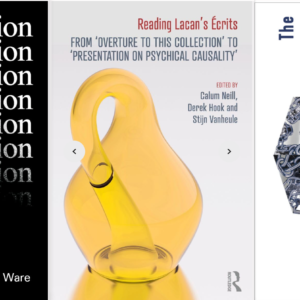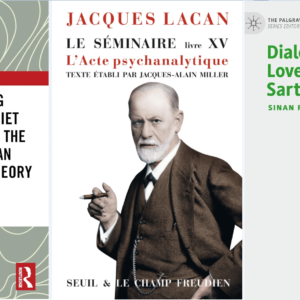News – October 2013
In Belgium last month, a law was proposed with the aim of regulating psychoanalysis by assimilating it with the psychotherapies. Regulars to this site will remember that a similar law was proposed in the UK and opposition to it was extremely strong, not just from the Lacanian scene but from across the psychotherapies. This resulted in the successful abandonment of the proposals after opponents won a Judicial Review. In a similar fashion to the fight in the UK, the law will make it impossible for non-psychologists or non-physicians to practice psychoanalysis, representing a massive step back of almost a hundred years, reminding us of the arguments made by Freud himself against exactly such a proposal in The Question of Lay Analysis. A petition has been put together by the Belgian Psychoanalytic Federation which you can sign at http://www.fabep.be. Although the text is in French and Dutch, a translation into English is below:
“The Belgian legislature is putting forward a proposal on the practice of psychotherapy in general and of psychoanalysis in particular. All the analytic associations organized under the umbrella of the FABEP (Belgian Psychoanalytic Federation) agreed last Sunday [Oct. 20] on an “Appeal to the Belgian Parliament”, and to circulate this document in the form of a petition for which the signatures of analysts and friends of analysis would be solicited.
“The major points of the legislation proposed are:
Psychoanalysis be assimilated into psychotherapy.
Psychoanalysis will only be performed by physicians and psychologists, following a 5400-hour training that will only be provided by universities.
A High Council of Psychotherapy will be created.
The psychoanalyst and/or therapist who is not a physician will have to establish a dossier for each patient and inform the treating physician of the “development of his/her health”.
“Psychoanalysis is in danger. If this legislation goes forward, psychoanalysis as such will become extinct.
“This is why we are asking you to sign, and to get as many colleagues as possible to sign, this “Appeal to Parliament”. It is for the future of psychoanalysis in Belgium. We must get as many signatures as possible, as rapidly as possible.
“Link to petition: www.fabep.be“.
Events
If you’re in London this Wednesday, 6th November, check out the book launch for James Penney’s After Queer Theory: The Limits of Sexual Politics. Full details on the event can be found here. The book’s premise – that queer theory has run its course – is an interesting and provocative one that Penney approaches from a Lacanian perspective. The book is out on 20th November in the UK and 17th December in the US. Pre-order it from Amazon US or UK.
Birkbeck, University of London, will be running an Introduction to Lacan course starting in January 2014 for 9 weeks. It is open to all to complete as a one-off module or part of a Certificate. A brief description of the course is below; here’s the link for more information.
This module introduces the central themes of the important and influential work of French psychoanalyst Jacques Lacan (1901-81). Lacan’s famous ‘return to Freud’ will be contextualised within the field of psychoanalysis, but no prior knowledge of Freud or Lacan will be assumed. Themes concerning the unconscious, subjectivity, language and desire will be considered in the context of Lacan’s use of linguistic theory to transform understanding of the workings of the psyche. Theoretical and clinical contexts will frame the module. A visit to the Freud Museum will be included at the beginning of the module. The module will be of interest to students of psychoanalysis and also to those interested in literary theory, art, film or the wider culture where Lacan’s ideas have had a significant impact in the last century.
Wednesday 15th January 2014, 10.30am-1pm, Birkbeck College, 9 meetings.
Last month saw the announcement of a new network, Psychoanalysis Across the Disciplines, an Institute of Advanced Study research network based at Warwick University in the UK. The network is open to all and welcomes the participation from psychoanalytic researchers in all fields. A regular speaker programme will be run, a lunch time reading group, and ad hoc events such as film nights and workshops throughout the year. Email psychoanalysis@warwick.ac.uk to be added to distribution list to receive notifications of forthcoming events or visit www.warwick.ac.uk/psychoanalysis. The next event is coming up on the 14th November when Dorothee Bonnigal Katz will present her paper, ‘The Place of Psychosis in Freudian Metapsychology and Technique: Topographical and Clinical Reflections’.
The organisers of next year’s Congress of the World Association of Psychoanalysis (referred to as WAP in English, AMP in French) continue to put out regular newsletters in preparation for the event. October’s here features a call for papers for the clinical day and an article by Mauricio Tarrab on the function of the semblant. You can also visit the Congress’s main site at http://www.congresamp2014.com. October also saw the publication online of Eric Laurent’s paper ‘On the Real in a Psychoanalysis’, which is on the Congress’s site here.
Coming up very soon in New York, on Friday 8th November, is an event by Après-Coup, the independent Lacanian training organisation. Parisian Lacanian psychoanalyst Claude Rabant will be giving a seminar entitled ‘The Night Is Not So Black’. The following morning Rabant will also be giving a seminar on ‘The Frenzy of Fathers’. Details can be found on the group’s site under ‘Current Events’ http://www.apres-coup.org/.
Also coming up in February in New York next year are the Seventh Clinical Study Days organised by Lacanian Compass http://lacaniancompass.com/. This time the event is on the theme ‘Paradoxes of Transference’. Guest speaker is Miquel Bassols, incoming President of the World Association of Psychoanalysis.
In Dublin, the Irish Circle of the Lacanian Orientation will be holding an event on Saturday 9th November with the theme ‘Mother, Mother, Mothers: Literature and Psychoanalysis in Dialogue’. To register check out their site here and for more information check out this.
A report on one of the ICLO-NLS’s events in September was published last month and can also be read on their site. The Hellenic Society of the NLS staged a Knottings Seminar in Athens at the end of September on the theme of the next NLS Congress, ‘What cannot be said: desire, fantasy, real’. A report on that event can be found here. Finally, as previously reported, The SITE for Contemporary Psychoanalysis in London held its annual conference recently and you can read some post-conference thoughts by one of its members, Barry Watt, on the group’s site.
Two calls for papers were put out in October. Firstly, for the 11th edition of the International Lacanian Journal of Psychoanalysis, Hurly-Burly. Anyone interesting in contributing can find more details here. The deadline is 15th January 2014. Secondly, a call for papers from the Athens Institute for Education and Research (ATINER) which will be holding its 8th International Conference on Psychology on 26th-29th May 2014 in Athens, Greece. Papers in English from all areas of psychology are welcome. More details.
Worth a watch are the thoughts of two prominent Lacanians on using Lacanian theory in the workplace at two recent events. Firstly, Paul Verhaeghe at TEDx on why ‘team building’ games are actually more about the survival of the fittest; and secondly, Dany Nobus’ on ‘Group Spirit, Work Transference and Dissolution’ from the recent ‘Re-working Lacan at Work’ conference. If you’ve ever had to sit through regurgitated nonsense at corporate training days, like Maslow’s hierarchy of needs or the well-worn claim that over 90% of communication is nonverbal, Nobus’ talk will certainly be of interest.
Publications
The presentation by Jacques-Alain Miller entitled ‘The Other without Other’ which closed the NLS (New Lacanian School) Congress in Athens in May is now available online. It builds on the premise stated by Lacan in Seminar VI that there is no Other of the Other, which Lacan also said in that Seminar was the deepest secret of psychoanalysis. It is also published in the journals Mental 30 and Hurly-Burly 10. Credit to Philip Dravers for the translation from the French.
A new book under the editorship of Ian Parker and David Pavón-Cuéllar, Lacan, Discourse, Event: New Psychoanalytic Approaches to Textual Indeterminacy, was published in October. It’s almost 400 pages contain 27 articles from prominent Lacanians on the emerging field of Lacanian Discourse Analysis.
A couple more new works of note that are due to be released in 2014 but are now available for pre-order include a version of Seminar X in English under the editorship of Jacques-Alain Miller and a work on Lacan’s legacy by Elisabeth Roudinesco, Lacan: In Spite of Everything.
On the wider web, Lacan’s work got some interesting attention last month.
Firstly, a paper co-authored by Robbie McLaughlan and Maria-Daniella Dick was published on Ctheory.net last month. ‘The Desire Network’ looked at the idea of Lacanian desire, experience and what the authors call the cyber super-ego. The authors address a pertinent and contemporary topic through an in-depth discussion of how Facebook offers us, as they put it, “an undoing of the Copernican revolution, a reinstating of the self at the centre of the universe.” Well worth a read. Check it out here.
Secondly, there were some very interesting thoughts on Lady Gaga and Lacan in respect of her latest album ARTPOP and the hysteric’s discourse. These were published in late October on Gaga Stigmata, a Lady Gaga site that describes itself as “the first mover in Gaga studies”. Also well worth checking out.
Finally, for some reason the famous clip from Lacan’s 1972 lecture at Louvain when he was accosted (or ‘trolled’) by the young, floppy-haired Marxist student was doing the rounds on Twitter last month. Many people made the accusation that the confrontation was staged, which is perhaps a little unlikely. However, it presents the opportunity to revisit the clip, which Dangerous Minds called ‘The single most ‘French’ moment of 1972. Jacques Lacan accosted but no one stops smoking’.
Got news? Get in touch.




Leave a Reply